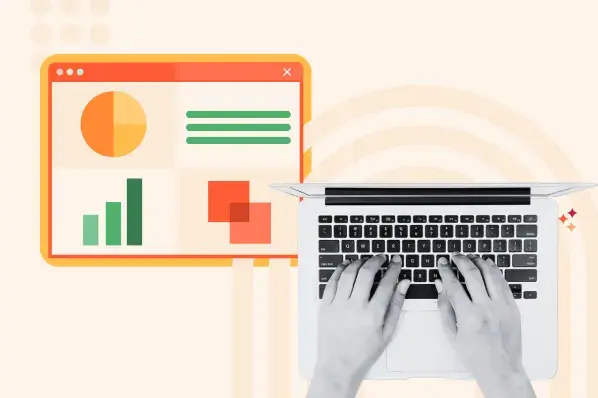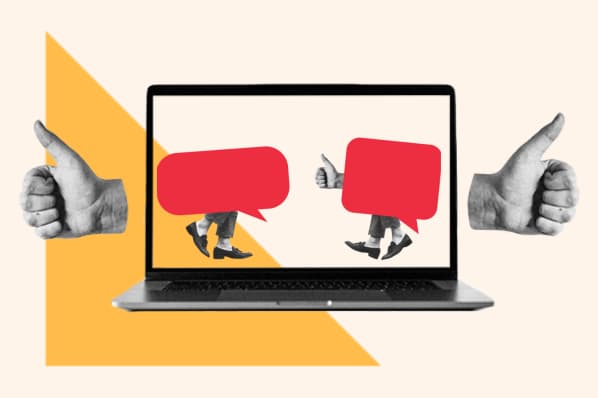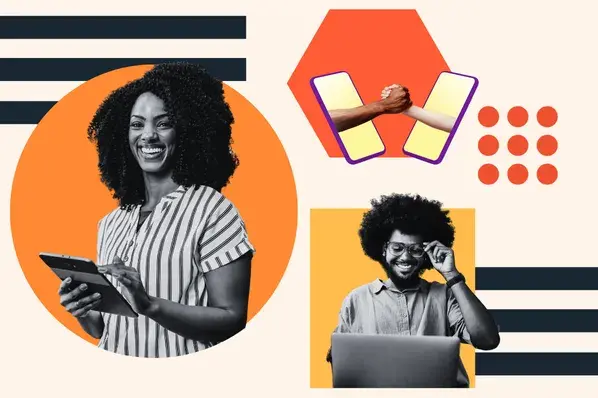The use of artificial intelligence in business is growing, and marketers are eager to learn how to leverage it for new and unique campaigns.

Creating high-quality imagery and collateral is a time-consuming and expensive process, but with the introduction of AI imagery, businesses can save money and time. However, the sudden popularity of the software has raised concerns about its ethicality in the creative community — questioning if its use should even be encouraged in the first place.
In this post, we'll define AI imagery and tell you what you should know before incorporating it into your business strategy in 2023. And if you're short on time, use these jump links to get the information you need:
What are AI images?
AI images are photos generated by artificial intelligence software using algorithms to judge and mimic pre-existing images for new visuals.
AI images are the new, trendy way to create visually appealing images of search queries — without the wait. They work by scouring search engine results to create content that is similar to what's already on Google, with the ability to combine keywords to make something new.
For example, if you search "Vincent Van Gogh" in Google Images, you'll see many of the artist's most famous paintings and self portraits. Now search, "basketball moves" and you'll see players in dynamic poses on a court. AI image software can take the characteristics of these search queries and create images like this:
"Vincent Van Gogh is showing his basketball moves"

While this technology is fun and exciting to explore, its usage is a point of conflict for many marketers looking to incorporate new strategies for image creation. Let's discuss why you should or shouldn't use it in your marketing plan.
The Pros and Cons of AI Imagery

Pros of AI Imagery
1. It's a cost-effective alternative to hiring illustrators or other designers.
For many businesses exploring different ways to cut down costs amidst the recession or for smaller companies that don't have the budget to expand their teams, using AI imagery software can be much more affordable than hiring illustrators or graphic designers.
Depending on the program, this technology can cost as little as $20 a month — or, in some apps, even free of charge. Having unique content without the cost of manual labor can be a huge value add for a business.
2. AI images make content quickly.
The magic of AI imagery lies in the turnaround time. Commissioned digital artwork takes time and explicit direction before it can reach completion. This software can take a person's search inquiry and return multiple image results in under a minute.
3. AI images can create unique-looking content specific to your needs.
AI image software works off the keywords you give to create content that serves your business needs. You can get the results you want without an intermediary to exchange ideas or make compromises with.
Cons of AI Imagery
1. AI images build off other people's work and can replace jobs.
There's a lot of fear behind the popularization of AI in business, particularly for artists. As automation grows and businesspeople supplement manual labor with a machine, the future is uncertain for those whose specialty is reduced to a software feature.
It's also worth noting that for AI image software to improve, it has to build off pre-existing work. It would be problematic for someone to blatantly copy a piece of art, and that's essentially what AI image applications do. The software doesn't credit the original artists it mimics, raising concerns about the integrity and the practice's legality.
2. AI image quality needs to be more consistent.
While AI is gradually becoming more intuitive, its product can't render "perfect" images. The resulting artwork can sometimes look odd or confusing, generating things like odd body proportions or creating architecture that defies the laws of physics. Some of the funniest image results from AI image generators I've seen have been about how bad they are at generating hands.

3. AI images still have to be vetted and edited by people.
Since the results of AI image generators can be imperfect, they still need to be examined by people before approval for any business use. Marketers should expect to have team members check and edit images for unsightly or distasteful pictures — as some image results can be offensive or out-of-touch.
AI Image Generators
1. DALL-E 2
Pricing: Free

DALL-E 2 is arguably one of the market's most advanced AI image generators. Made by OpenAI, an artificial intelligence research lab founded in 2015, it's highly advanced and generates accurate and detailed depictions of search inquiries.
What We Like:
- Produces batches of images per single search inquiry
- The software has editing capabilities built-in
2. Fotor
Pricing: Free and premium plans available

Fotor is a renowned AI image generator with more than 14M users worldwide. Fotor AI image generator, easy to convert your ideas to images, art even transform your own images into AI-generated images in a few seconds. Additionally, Fotor is a well-trusted photo editor, allowing you to edit your AI image to perfect your project and expand your creativity.
What We Like:
- Multiple styles to choose from.
- Available on mobile device.
3. Jasper Art
Pricing: $40/month, Contact Vendor for a custom plan

Jasper Art is a platform well-trusted by over 70,000 leading brands, agencies, and content creators. Its AI image generator promises users the perfect picture to match their messaging and wants to help marketers get the image they want without scrolling through stock image galleries to find it.
What We Like:
- Offers high-resolution images suitable for printmaking
- Creates four AI images at a time
4. Dream by WOMBO
Pricing: Dream Premium; $4.99/month

Dream by WOMBO is a Canadian artificial intelligence software platform that turns your ideas into an AI-powered painting in seconds. The creators aim to provide the world with AI-powered tools to immerse themselves in entertainment. With over 65 million app installs, it's a popular software.
What We Like:
- Available on mobile devices
- Ability to categorize and sort through existing creations
5. Craiyon
Pricing: Free

Formerly known as DALL-E mini, Craiyon is a quick and straightforward software that creates interesting images in seconds. While it doesn't have editing capabilities, it does offer the service for free and without signup.
What We Like:
- It doesn't require registration or login for usage
- Generates nine images per search inquiry
6. Freepik AI Image Generator
Pricing: Free and premium subscriptions
Freepik is a platform dedicated to providing creative freedom for everyone. And Freepik’s new AI image generator tool is the icing on the cake. Users simply have to write a detailed text prompt, select a visual style (AI Image, 3D, digital art, painting), and in seconds, your fantasies will become reality.
You can even edit them on the go!
What We Like:
- Multiple styles to choose from
- You can edit the AI-generated images in its in-browser editing tool (premium members only)
7. NightCafe
Pricing: Contact Vendor
NightCafe is an AI image generator capable of making art based on descriptive text and style categories. The high-resolution results are unmatched compared to alternative platforms and can create content well fit for physical prints.
What We Like:
- Five free images per day
- Wide variety of art styles in the catalog
Alternatively, if you don't feel comfortable using these AI-powered image generators, there are more common and resourceful solutions for you to consider.
AI Image Alternatives

While you might not create images in under a minute, you can still produce quality and creative visuals for your business without the potential plagiarism or negative feedback.
AI images are an imperfect art and solution.
Using new technologies for business is always exciting for marketers, but it comes with uncertainties. I recommend that marketers be cautious before using AI images for business purposes until there are regulations on what can be harvested for content creation. But for those interested in trying it, we hope you create the images you need to achieve your goals.





![How Marketers Save Time and Make Data-Backed Decisions with AI Reporting [+ Expert Insights]](https://www.hubspot.com/hubfs/AI-reporting-1-20241021-8635550.webp)


![AI in Graphic Design: The Pros, Cons and What it Means for Designers [+ Expert Insight]](https://www.hubspot.com/hubfs/Untitled%20design%20-%202024-10-15T175328.927.jpg)

